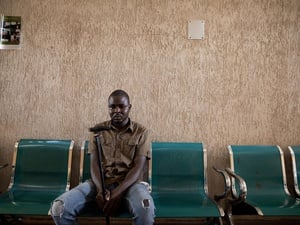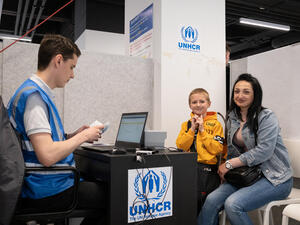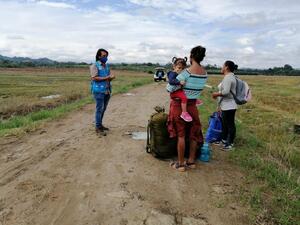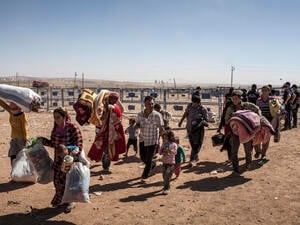Lubbers welcomes drop in asylum numbers in industrialised countries
Lubbers welcomes drop in asylum numbers in industrialised countries

GENEVA, Feb 24 (UNHCR) - UN refugee agency chief Ruud Lubbers has welcomed news of a dramatic drop in asylum numbers in the industrialised world as UNHCR released its 2003 statistics today.
According to the provisional figures, last year saw a 20-percent fall in the number of asylum seekers arriving in 36 industrialised countries. Some 463,000 asylum claims were made - the lowest since 1997, and the third lowest since 1988.
The European Union also recorded record lows in 2003 asylum applications - down 22 percent from the previous year, to 288,000. This was the lowest since 1997, and well under half the record high of 669,000 in 1992, during the Balkan wars. The EU historical comparison did not include Italy as its 2003 figures were not available.
"I welcome this news," said High Commissioner Lubbers. "Most of the major groups of asylum seekers - especially the Afghans, Iraqis and people from Serbia and Montenegro - have decreased in number, which reflects the significant changes in their home countries and regions."
However, he cautioned, "We cannot relax yet. The improvements remain fragile in many countries, and there needs to be continued investment of aid and resources in the regions of origin to ensure that the trend is not reversed."
The United Kingdom received the most number of asylum seekers in 2003, with 61,050, followed by the United States (60,700), France (51,400) and Germany (50,450). However, these numbers were substantially lower than the previous year - down 41 percent in the UK, 26 percent in the US, and 29 percent in Germany, its lowest total in 19 years.
High Commissioner Lubbers noted that particularly in Europe, the heated debate on asylum and the hardening of attitudes were to a considerable extent driven by the high numbers that arrived during the 1990s. "Now that the numbers have dropped back to the levels we were seeing in the late 1980s, I hope the debate will focus once again on the vital need to protect refugees, as well as the need to find permanent solutions for them, and better ways to share the burden among states," he said.
For the most part, increases were confined to countries that receive relatively small numbers overall, including several states that will be joining the EU in May. Cyprus rose 364 percent, from 950 in 2002 to 4,410 in 2003; Malta rose 63 percent to 570; Slovenia was up 57 percent to 1,100; and the Czech Republic and Poland both rose by 34 percent to 11,390 and 6,920 respectively. Overall, the 10 states joining the EU saw an increase of 16 percent, from 32,100 to 37,300.
"This trend shows the importance of continuing to help the new EU member states build up their capacities," said Lubbers. "It also underlines the need to find common solutions in the form of burden-sharing at the European level."
In terms of asylum-seeking nationalities, Russians - mostly Chechens - topped the list in 2003 with 33,400 applications (data from 29 rather than the full 36 industrialised countries), up 68 percent from the previous year. They were concentrated in Austria (6,700), Poland (5,600), the Czech Republic (4,900), Germany (3,400) and Slovakia (2,700).
Russians were the only nationality to increase among the top eight nationalities seeking asylum in 2003. Of the top 39 nationalities, only four recorded increases from the previous year.
Iraqis, the top asylum-seeking group in 2002, dropped by 50 percent to 24,700 in 2003. Within 2003 itself, their numbers dipped dramatically from 4,200 in January to under 900 in December.
Afghans, the top group in 2001, declined by 46 percent between 2002 (25,500) and 2003 (13,800). Since 2001, UNHCR has helped more than 2.5 million of them to return home. Asylum seekers from Serbia and Montenegro (including Kosovars) - the top group from 1998 to 2000 - also fell by a further 23 percent in 2003, to 24,800.
Important decreases have also been reported in Africa, where a number of countries have seen a significant improvement in circumstances in recent years. Angolan asylum seekers in 2003 fell by 46 percent compared to 2002, Sierra Leoneans fell by 58 percent, while asylum seekers from the Democratic Republic of the Congo fell by 22 percent.
Somalis, who increased by 7 percent, were the only major African asylum-seeking nationality to go up in 2003. Conditions in Somalia cannot be said to have improved, and the country effectively remains without a central government.









